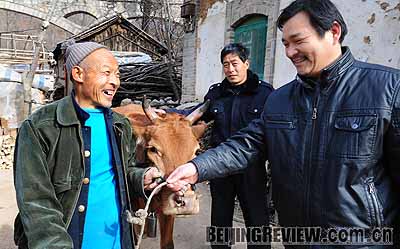|
 |
|
LIVING GIFT: A local government representative presents 65-year-old Zhao Tianren in Songxian County, Henan Province, with a bull to help him earn a living on December 30, just before the New Year set in (WANG SONG) |
Raising the poverty threshold places millions more in the path of government assistance
The new poverty line adopted by the government will come into effect in 2009, officials from the Poverty Relief Office of the State Council confirmed. The new standard has increased the number of people to 43.2 million, according to Caijing magazine.
Earlier data, based on a yearly income of 786 yuan ($115), put the population below the poverty line at 14.79 million.
The poverty line is the minimum level of income deemed necessary to achieve an adequate standard of living in a given country. The Chinese Government has now raised the threshold, saying a per-capita earning of less than 1,067 yuan ($156) a year will be considered below it.
Scholars and international organizations challenged the previous poverty line of 786 yuan ($115), which they said did not reflect reality, so the government chose to change it, said Liu Fuhe, Director of the Department of Policy and Regulations under the State CouncilÕs Poverty Relief Office.
The new poverty line was introduced in October 2008 during the Third Plenary Session of the 17th Communist Party of China Central Committee. The poverty line was raised after the Ministry of Civil Affairs introduced minimum income protection scheme in rural areas in 2007 so that more poor people could be brought under the poverty alleviation scheme.
Raising of the poverty line means more people will be covered by the governmentÕs poverty relief schemes, on which the Central Government has spent 16.7 billion yuan ($2.4 billion) in 2008, 2.3 billion yuan ($330 million) more than in 2007, according to Caijing.
ÒWe have been adjusting our work in accordance with the new standard,Ó Liu said. The extent of the adjustment will depend on how many more people are pushed into poverty by the economic slowdown and inflation, which would vary from region to region, he added.
More money will be spent this year to help the poor, especially jobless migrant workers forced to return home amid the economic slowdown who could slip back into poverty.
ÒThe income of a rising number of migrant workers forced to return home will fall,Ó Liu said.
By the end of 2007, ChinaÕs rural population in absolute poverty had been reduced to 14.79 million, accounting for 1.6 percent of the countryÕs total rural population, according to Liu.
He said that in accordance with the Chinese Government standard for poverty alleviation, people living in absolute poverty in rural areas that have not solved food and clothing problems declined from 250 million in 1978 to 14.79 million in 2007. In 1978, 30.7 percent of ChinaÕs rural population were living in absolute poverty. By 2007, this figure had fallen to just 1.6 percent.
The group that has preliminarily solved food and clothing problems, but still does not have a stable income has been reduced to 28.41 million, which accounts for 3 percent of the total population of rural residents. The quality of life and the income level of the impoverished population have also greatly improved.
Liu further stated that according to data provided by relevant international organizations, from 1990 to 2007, China has contributed over 70 percent to the reduction of impoverished people in the world. China is the first to have reduced the impoverished population by half, which is a UN Millennium Development Goal. Its poverty alleviation achievements and development have accelerated the process of global poverty reduction.
ÒPoverty reduction in the last three decades has been the fastest in Chinese history, which seems to be a miracle,Ó said Lennart Bage, President of the International Fund for Agricultural Development during an interview with Xinhua in December 2008.
ÒThere are important lessons from such achievements for other countries. First of all, right agricultural policies allowed farmersÕ use of land. The reforms that began in 1978 introduced novelty that catalyzed food production and food safety, as well as the development of industry and services,Ó Bage noted.
China first announced a poverty line in 1985, saying people earning less than 200 yuan ($29) a year would be considered living in poverty. Later the poverty line was slightly adjusted every year with changes in the CPI in rural areas.
China Statistical Yearbook showed that the absolute poverty line in 1987 was 227 yuan ($33) and in 2007 it was 786 yuan ($115).
In the world context, ChinaÕs poverty line was lower than the international standard: $1 a day, according to Fan Xiaojian, Director of the State Council Poverty Relief Office.
ÒChinaÕs new standard is still at a low level,Ó said Liu. He calculated that China might have a poverty population of 100 million in light of the international standard of $1 a day.
